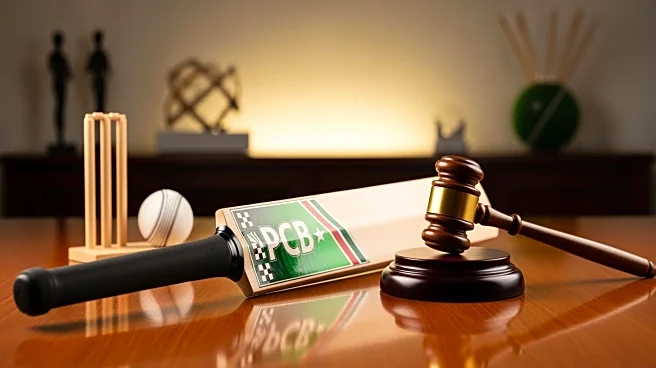What's Happening?
Mohsin Naqvi, the chairman of the Pakistan Cricket Board (PCB), will not attend the International Cricket Council (ICC) Board meeting due to his commitment to a Senate session in Islamabad. Naqvi, who
also serves as Pakistan's interior minister, is required at the Senate meeting where the proposed 27th Constitutional Amendment is expected to be presented and approved. His absence from the ICC meeting spares him from a potential conflict with the Board of Control for Cricket in India (BCCI), which plans to raise concerns about Naqvi's dual roles as PCB chairman and interior minister, citing a conflict of interest under ICC governance rules.
Why It's Important?
Naqvi's absence from the ICC meeting highlights ongoing tensions between the PCB and BCCI, exacerbated by past controversies such as the Asia Cup row. The BCCI's planned charge sheet against Naqvi underscores the complexities of governance in international cricket, where political roles can intersect with sports administration. This situation could impact the PCB's influence within the ICC and affect bilateral relations between Pakistan and India, particularly in cricket diplomacy. The outcome of the Senate session and the proposed constitutional amendment could also have broader implications for Pakistan's political landscape.
What's Next?
With Naqvi occupied in Islamabad, PCB Chief Operating Officer Sameer Ahmed Syed is expected to represent Pakistan at the ICC Board session in Dubai. The BCCI's concerns about Naqvi's dual roles may lead to further discussions or actions within the ICC, potentially affecting governance rules and the relationship between the PCB and BCCI. The Senate session's outcome could influence Naqvi's future involvement in cricket administration, depending on the political developments in Pakistan.
Beyond the Headlines
The situation raises questions about the ethical dimensions of holding dual roles in government and sports administration, particularly in international contexts. The ICC's governance code prohibiting government interference in national cricket boards is a critical point of contention, reflecting broader issues of governance and autonomy in sports organizations. The strained relations between the PCB and BCCI could also impact cultural exchanges and sports diplomacy between Pakistan and India.








